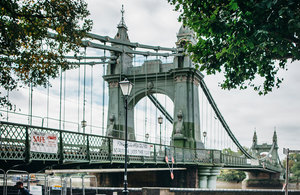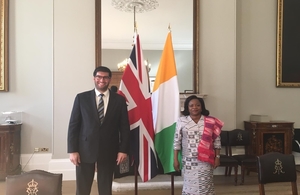Thank you, Mr President. Let me also thank Under-Secretary-General Lowcock for his briefing, as well as Special Envoy Martin Griffiths.
Mr President, it is not often that we start Yemen discussions with reasons to hope. So let me begin by welcoming the prisoner release news. The first flights happened today following the agreement on 27 September by the parties to release 1,081 prisoners. And I want particularly to applaud the efforts of the International Committee for the Red Cross in this regard.
It’s not just about this specific confidence-building measure; today’s news also demonstrates that dialogue can lead to positive outcomes. That momentum now needs to be carried into the political tracks. The parties must agree urgently to the United Nations Joint Declaration. On the Riyadh agreement, I welcome the Kingdom of Saudi Arabia’s leadership to achieve a resolution and urge the parties to form a government rapidly.
I want to echo what Martin Griffiths said about the importance in this anniversary month of Resolution 1325 of the inclusion of women in political processes, including in Yemen.
Now I want to also welcome Martin Griffith’s assessment that the violence in Marib has decreased recently whilst echoing his call for it to stop completely. It has passed into its sixth month and has caused untold cost in the lives of many Yemenis – young and old, men and women. And the fighting that has now opened up in Hodeidah is not only in clear breach of the Hodeidah Agreement, but it is needless and it will only lead to further instability in a country which is staring down the barrel of disease and famine. So I want to call today for renewed and urgent engagement with UNMHA and the UN Special Envoy in order to reach a ceasefire. And I stress that the Yemeni parties – which means the Government of Yemen just as much as it means the Houthis – should cooperate with the Special Envoy to agree to this Joint Declaration proposals as soon as possible. I want to reiterate the United Kingdom’s full confidence in the UN-led process and the UNSE Griffiths.
Mr President, on 22 September, the Spokesman of the Iranian Armed Forces, General Shekarchi, admitted that Iran had provided technical assistance and training to the Houthis. This represents an apparent breach of the arms embargo. This is deeply concerning and reaffirms our concerns about destabilising Iranian activity in Yemen and the wider region. We call on Iran to cease such activity, which risks escalating the conflict, and to support a political solution to the conflict in Yemen.
Mr President, we must prevent Yemen tipping into famine. We welcome the recent positive steps by some donors to provide humanitarian funding, including new commitments from the United States, Kuwait and some EU Member States, as well as seeing Saudi Arabia sign agreements with UN agencies. The United Kingdom itself recently announced over $65 million dollars in additional funding, taking us to over $250 million dollars for this year and building on nearly $300 million dollars last year. Globally though, funding levels for Yemen remain alarmingly low at 42 percent, with less than half the level of funding from this time last year.
Meanwhile, severe access constraints – some in the south, but mainly in Houthi areas – continue to prevent the delivery of lifesaving assistance. This is recklessly driving up the risk of famine. As of 27 September, 94 NGO projects with a cumulative budget of $218 million dollars, remained unimplemented, largely due to Houthi restrictions. All barriers, wherever they are in the country, to humanitarian access must immediately be removed, and the Houthis must give the United Nations and NGOs the permissions they need to operate and save lives across the north.
Mark Lowcock welcomed the reopening of Sanaa Airport for humanitarian cases. And I want to agree with him and say that it is essential that Sanaa Airport and Hodeidah port are kept open and that both parties come to an immediate agreement on fuel imports, as Martin Griffiths laid out.
If we’re to avoid famine, it’s essential as well that the Central Bank of Yemen is swiftly provided with external financial assistance so it has sufficient hard currency to sustain food imports and stabilise prices. Food affordability, rather than availability, seems to be the main driver of hunger at present. The exchange rate in the south has reached its lowest level since the conflict began. And food security is rapidly deteriorating. The proportion of people unable to find sufficient amounts of food increased from 28 percent in May to 43 percent in August. The Government of Yemen has a critical role to play here, too. They urgently need to develop a credible and transparent economic plan that reassures donors of their ability to implement economic reform.
Finally, Mr President, I want to welcome the tentative news that UNOPS and the Houthis appear to have agreed in principle to a mission to conduct an assessment and subsequent light repairs on the Safer oil tanker. I understand that it could take well over a month for the experts’ work to be completed. And so any unnecessary delay must be avoided. I look forward to next month’s briefing and hope that we will have news then that the mission is underway. And I also want to thank Germany, the Netherlands and France for joining the United Kingdom and Saudi Arabia in providing funding for the initial mission.
Thank you, Mr President.

